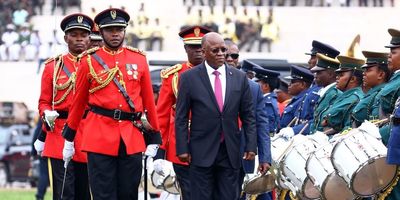Tanzanian Government Limits International Media Coverage of Upcoming Elections
President John Pombe Magufuli has passed a law that now limits international media coverage of the upcoming elections as the country's opposition receives increasing support.
President John Pombe Magufuli has tightened his grip on media by passing a set of laws that limit international media coverage of upcoming elections. Magufuli, who is running for president again, has officially banned international media from broadcasting news made without the government's approval. The Tanzanian Communications Regulatory Authority announced the new laws which will affect collaborative media reportage between domestic and international news outlets.
READ: Tanzania Has Made It Illegal to Plan and Support Protests Online
Tanzania's elections are set to take place towards the end of October this year and has resulted in incremental censoring of media by President Magufuli. The latest regulations require that media broadcasters first seek permission from the government within seven days of their desired coverage. Additionally, international media teams are required to have a government-appointed representative during the coverage. Local journalists have called the move an infringement on human rights and journalistic freedom. Further government regulations have imposed a ban on registered Tanzanian media outlets who frequently collaborate with international media for broadcasts.
Tanzanian journalist Fred Muvunyi, who works for German news platform DW, says that he has "never seen or heard anything like this in [his] life as a journalist."
Governments shutting down internet connections, banning public demonstrations, suppressing media freedom and silencing dissenting views from citizens has been ongoing in Africa. Recently, Algerian journalist Drareni Khaled was sentenced to three years in prison for covering anti-government protests in the country. #ZimbabweanLivesMatter was sparked by the government's violent response to public demonstrations in addition to the mass arrest of activists, opposition leaders and citizens.
Additionally, the Ivory Coast also passed a law that bans public protest during elections. The Somalian, Ethiopian and Burundian governments have in the past, shut down internet access as a way in which to thwart public protests. While Amnesty International and the United Nations have condemned a number of African heads-of-state for infringing on human rights, it has had little effect.
- Tanzania Has Made It Illegal to Plan and Support Protests Online ... ›
- #FreeErickKabendera Speaks Volumes about Tanzania's Approach ... ›
- Tanzanian Government Declares Country Free of COVID-19 ... ›
- Former Tanzanian President Benjamin Mkapa Has Died - OkayAfrica ›
- Trump Plans to Extend Travel Ban to Nigeria, Tanzania, Sudan ... ›
- Dar es Salaam's Regional Commissioner Wants to Combat Infidelity ... ›
- Immigrants from Nigeria, Eritrea, Tanzania, Sudan & More 'Virtually ... ›
- Ghana's Nana Akufo-Addo Wins Second Presidential Term - OkayAfrica ›
- Tanzanian President John Magufuli Has Died - OkayAfrica ›
- Samia Suluhu Hassan Becomes Tanzania's First Woman President - OkayAfrica ›
- Tanzanian filmmaker Amil Shiviji makes history at TIFF with his story of love and resistance ›
- Tanzanian filmmaker Amil Shiviji makes history at TIFF with his story of love and resistance - OkayAfrica ›
- Tanzanian Filmmaker Amil Shiviji is Making History with a Story of Love and Resistance - OkayAfrica ›
- Tanzanian Filmmaker Amil Shiviji is Making History with a Story of Love and Resistance - OkayAfrica ›
- Opposition Leaders Arrested in Tanzania Over Protest Against Abductions and Killings - Okayplayer ›
